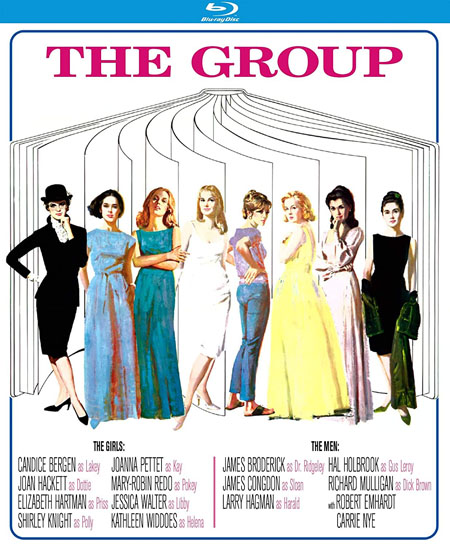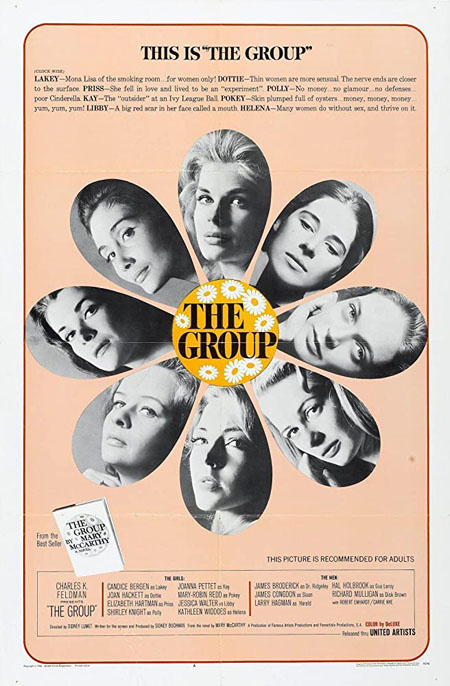
“THE
LIVES OF WOMENâ€
By
Raymond Benson
The
Group,
the 1966 film directed by Sidney Lumet, is based on Mary McCarthy’s 1963
best-selling novel that broke ground by presenting the extraordinary notion
that young women graduating from college in the 1930s had liberating thoughts
in their heads regarding politics, independence, sex, marriage, career, and
motherhood (SARCASM). In all seriousness, the novel did push the envelope, given
the time it was published. It challenged the notion of the All-American Girl’s
only role in society was to get married, have children, and serve her husband.
The
film, which was adapted for the screen and produced by Sidney Buchman, is a
reasonably faithful rendition of the novel, and, seeing that it was released in
that nebulous in-between period between the demise of the Hollywood Production
Code and the institution of the Movie Rating System in America, it is frank and
revealing—but perhaps not enough.
What
is most fascinating about the picture today are the performances by the eight
leading ladies, most of whom were just arriving on the scene and would go on to
bigger and better things. For example, The Group is Candice Bergen’s
first screen appearance.
The
time is 1933 at a fictional women’s college in New England (in the novel it is
explicitly Vassar). Eight women who are close friends refer to themselves as
“the Groupâ€â€”there is Lakey (Bergen), the most beautiful and popular one; Dottie
(Joan Hackett), the seemingly sensible one who makes some rash choices; Priss
(Elizabeth Hartman), politically liberal but too submissive when contested;
Polly (Shirley Knight), perhaps the most independent of the bunch; Kay (Joanna
Pettet), the most materialistic and the most victimized; Pokey (Mary-Robin
Redd), who we don’t get to know as well as the others; Libby (Jessica Walter),
who is the most ambitious and competitive; and Helena (Kathleen Widdoes), who
is perhaps the smartest one. The story follows the eight women’s lives after
graduation over the rest of the decade to the beginning of World War II, mostly
in and around New York City, as they date, get jobs, fall in love (or not),
marry, and have children (some successfully, others not so).

Aside
from a couple of exceptions, the men in their lives are portrayed as selfish,
abusive, and cruel. They are played by the likes of Larry Hagman, Richard
Mulligan, Hal Holbrook, James Broderick, and James Congdon. We also slightly
get to know some of the girls’ parents (one father, played by Robert Emhardt, deemed
as having a mental illness, insists on moving in with his daughter) and other
friends.
While
there is some attempt to give each of the eight ladies their “story,†the movie
focuses mostly on Kay (Pettit), whose emotional range is expertly displayed
throughout as she works to support her caddy, cheating husband; and Polly
(Knight), who approaches her love affairs with an arm’s length attitude and is
too attached to her father. On the second tier of screen time are Libby
(Walter), Dottie (Hackett), and Priss (Hartman), all of whom deliver fine performances
along with Pettet and Knight. Bergen’s character disappears after the first ten
minutes, goes to Europe, and doesn’t return until the last act of the movie.
Sidney
Lumet’s direction is assured as he moves the complicated and many-faceted
storylines along—and yet the picture is too long (at 2-1/2 hours). A lot is
packed into it, though, and something like this might have worked better as a
three-part television mini-series. (In a way, it is Sex and the City for
eight women instead of three, and in quite a different decade from that HBO
show.)
Most
notable about the movie is its dealing with topics not normally discussed on
screen in 1966, the year it was released—birth control, mental illness,
adultery, free love, liberal politics (in the 1930s, Left was LEFT!),
and even lesbianism.
Kino
Lorber’s new Blu-ray restoration looks quite good and comes with English
subtitles for the hearing impaired. Unfortunately, there are no supplements
other than the theatrical trailers for this and other Kino Lorber releases.
The
Group is
an interesting time capsule of a specific time in cinema history that shines a
light on a particular era in American history that, in turn, examines a distinctive
social class of gender-exclusive characters.
CLICK HERE TO ORDER FROM AMAZON